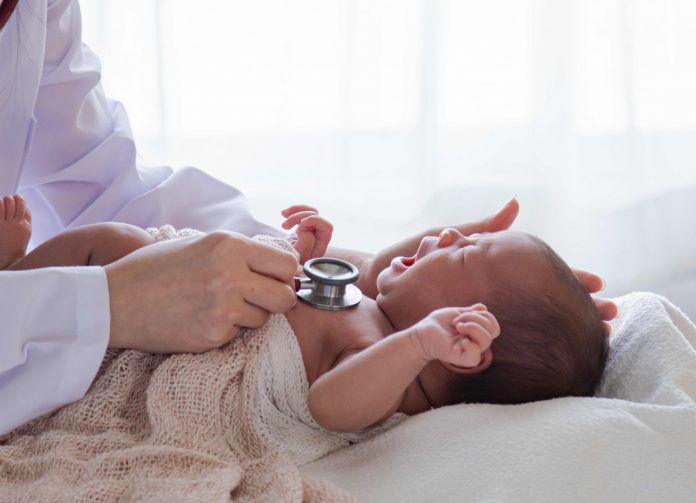Protection against the deadly respiratory syncytial virus (RSV) could be months away thanks to global research efforts into world-first immunisations that provide protection against this virus.
Published in The Lancet Infectious Diseases, the research reveals a long-lasting monoclonal antibody treatment for babies is likely to be accessible within 12 months.
It’s expected this will be followed closely by the approval of a maternal vaccine given during pregnancy to provide newborns with protection against the virus.
Final stages of development
According to Professor Peter Richmond, Head of the Vaccine Trials Group at the Wesfarmers Centre of Vaccines and Infectious Diseases, based at the Telethon Kids Institute, Head of Paediatrics at The University of Western Australia and Perth Children’s Hospital Paediatrician, researchers are now completing the final stages of development for numerous preventative antibody treatments and RSV vaccines.
“Observations from multiple studies conducted worldwide have shown there are nine potential candidates in Phase 3 clinical trials – the final stage prior to licensing for use – including two antibody immunisation treatments for prevention in babies and two maternal vaccines designed to be given to pregnant mothers,” Professor Richmond said.
“This is an especially exciting time for us – we started our first Phase 1 and 2 studies looking at RSV vaccines all the way back in 2000, and it has been a long journey to get to this point.
“Unfortunately, some of the early studies were unsuccessful and ceased in the development stages, but in 2016 we began to see positive results for a Phase 2 study looking at a monoclonal antibody treatment called Niversimab.
“We recently completed Phase 3 studies on Niversimab here in Perth, and there have been positive results reported from the northern hemisphere pre-Covid-19, so it is expected to be licensed for use as the very first RSV prevention treatment in the USA/Europe by late 2022 or early 2023.”
Professor Richmond says that the research team has recently commenced “a Phase 3 study on the second potential antibody treatment”.
This treatment, he says, is expected to “provide long-lasting protection for babies at highest risk of being hospitalised with RSV, including those born prematurely, or those with congenital heart disease or chronic lung disease”.
Maternal vaccine
Experts at the Telethon Kids Institute, the lead site in Western Australia for global studies, are currently finalising the development of a maternal vaccine for pregnant mothers and expect to see results in the coming months.
“I am very keen to make the most of this opportunity … as I believe the potential burden of disease we may be able to prevent will be even greater than first thought, including decreasing the amount of antibiotics that are prescribed, reducing ear infections in young babies and decreasing more serious bacterial pneumonias that are associated with RSV infection,” Professor Richmond said.
“There are also the potential benefits of preventing longer-term complications such as chronic lung infections and asthma.”
For Professor Richmond, a paediatrician who has looked after babies infected with RSV for the past 30 years, the idea that prevention is possible “is fantastic”.
“I feel privileged to have been involved in the process,” he said.
“In the next 10 years, I hope to see licensed vaccines and preventative drugs being given to mothers, babies, toddlers and older adults, with multiple vaccine and monoclonal antibody platforms available that could even be combined with Covid and influenza vaccines, keeping our hospitals and GP surgeries much quieter over winter.”
Assessing parental awareness of RSV
RSV infects the airways and lungs and can result in life-threatening complications such as bronchiolitis and pneumonia.
It’s said to be responsible for more than 100,000 deaths and 3.6 million hospitalisations in children each year.
However, one concern expressed by Professor Richmond is the lack of awareness by parents of RSV and “the pivotal role it plays in serious infections in young children”.
This, he says, may impact the uptake of the RSV vaccines.
In preparing for a future vaccine roll-out and for potential concerns with vaccine uptake, Associate Professor Hannah Moore, Epidemiologist from the Wesfarmers Centre for Vaccines and Infectious Diseases and the School of Population Health at Curtin University is in the process of assessing parental awareness of RSV.
“We’re conducting a survey to gauge knowledge of RSV throughout the community and ask pregnant families and parents of young children how they would feel about these vaccines being given to their newborn babies or in pregnancy,” A/Prof Moore said.
“This information will help us plan larger studies around community awareness and guide the development of educational materials for the general public, which will help parents feel confident about the vital importance of these long-awaited vaccines.
“We are also closely analysing the data we have collected about RSV in Western Australia to help shape vaccination policy and ensure the programs put in place have maximum impact.
“After many years working in this space, I can’t wait to see a safe and effective vaccine program for RSV implemented in our community, significantly reducing hospitalisations and longer-term effects of the virus,” she said.
For more information, visit: infectiousdiseases.telethonkids.org.au.







